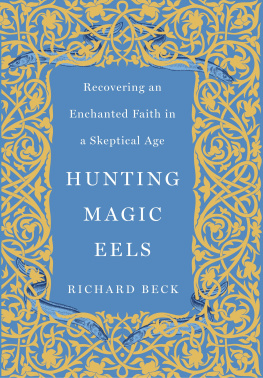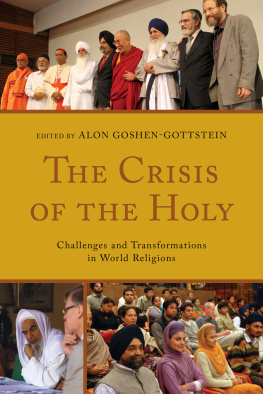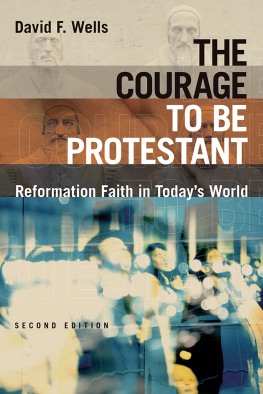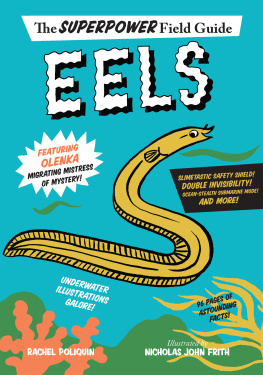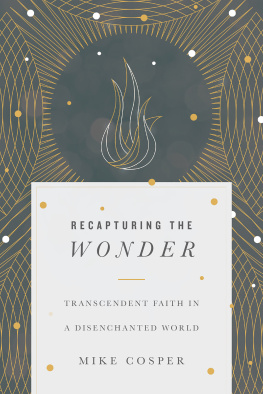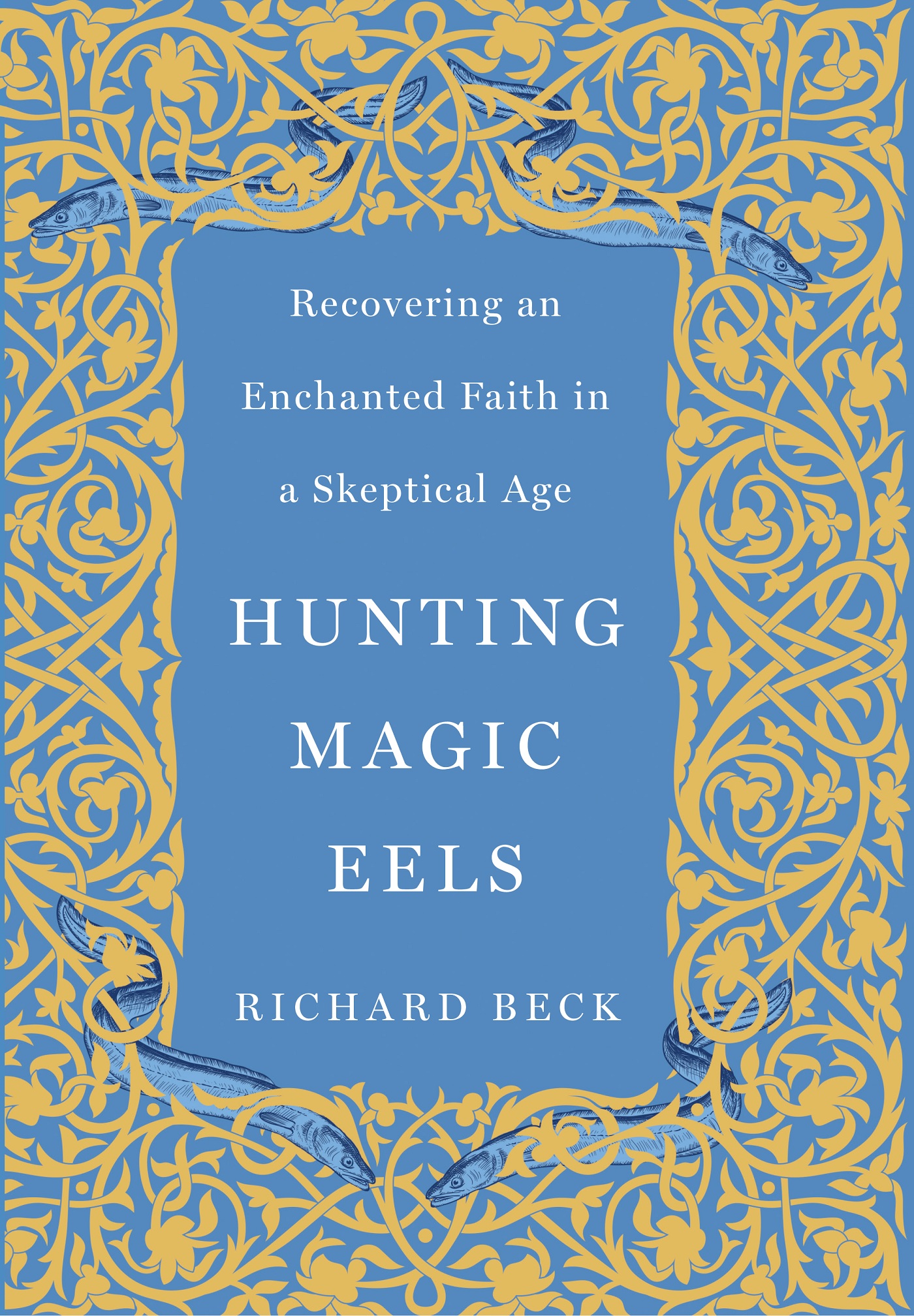
Hunting Magic Eels
Hunting Magic Eels
Recovering an Enchanted Faith in a Skeptical Age
Richard Beck
BROADLEAF BOOKS
MINNEAPOLIS
HUNTING MAGIC EELS
Recovering an Enchanted Faith in a Skeptical Age
Copyright 2021 Broadleaf Books, an imprint of 1517 Media. All rights reserved. Except for brief quotations in critical articles or reviews, no part of this book may be reproduced in any manner without prior written permission from the publisher. Email or write to Permissions, Broadleaf Books, PO Box 1209, Minneapolis, MN 55440-1209.
All Scripture quotations, unless otherwise indicated, are taken from the New Revised Standard Version Bible 1989 Division of Christian Education of the National Council of the Churches of Christ in the United States of America. Used by permission.
Cover image: eel: Navalnyi/shutterstock / fillagree: standa_art/shutterstock
Cover design: Olga Grlic
Print ISBN: 978-1-5064-6465-7
E-book ISBN: 978-1-5064-6466-4
For Hannah, David, and Gill
Contents
Strange Sights
We were hunting for magic eels.
Thats an odd opening for a conversation about revitalizing Christian faith in our secular, skeptical age. But stay with me.
The magic eelsor to be more precise, the legend concerning themare from Wales, where we were on holiday with our dear friend Hannah. We were visiting Llanddwyn Island, exploring the ruins of the abbey associated with St. Dwynwen. St. Dwynwen was a fifth-century Celtic saint and is the patron saint of lovers in Wales. Celebrated on January 25, St. Dwynwens Day is the Welsh version of St. Valentines Day.
Llanddwyn Island was a famous site of pilgrimage because of its holy well. Inhabiting the well were enchanted eels that could predict your romantic future. According to the legend, if the eels disturbed a token thrown into the well, your lover would be faithful for life. Not surprisingly, the church became very wealthy due to all the pilgrimages. Who needs premarital counseling when youve got magic eels?
Pilgrimages to Llanddwyn Island began to decline after the Protestant Reformation. Today, St. Dwynwens church is a ruin. And sadly, there is no longer a well with magic eels. Things have changed a lot over the last five hundred years.
I want to talk about these changes and their impact on faith in a world increasingly dominated by skepticism, doubt, and disbelief. We dont make pilgrimages to holy wells anymore to pray for our marriages. A world stuffed with supernatural wonders seems to be a thing of the past. Our world is secular, skeptical, and scientific.
Five hundred years ago, life was enchanted. God existed, and the devil was real. The world teemed with angels and demons. There were magical creatures and dark, occult forces. It was a world of holy wells and magic eels.
But with the Protestant Reformation and the beginning of the Enlightenment, the worldin the West, at leasthas grown increasingly disenchanted. We live in a world dominated by science and technology. Increasing numbers of us dont believe in God anymore, to say nothing about believing in the devil or angels. We dont expect miracles. We know that stage magicians arent sorcerers, that theres a rational explanation behind their tricks and illusions. The world of St. Dwynwen is viewed as quirky and quaint but also naive and superstitious. Weve grown up and left those fairy tales behind. Rates of agnosticism and atheism in the United States have been steadily, if slowly, increasing, especially among the young and college educated. Theres also the rise of the nones, people who no longer formally identify with any religious tradition. Our public sphere is increasingly described as secular and post-Christian.
This rising tide of disenchantment has profoundly affected our religious imaginations. Weve lost our capacity for enchantment, our ability to see and experience God as a living, vital presence in our lives. As Thomas Merton once observed in a talk he gave on August 20, 1965,
Life is this simple. We are living in a world that is absolutely transparent, and God is shining through it all the time. This is not just a fable or a nice story. It is true. If we abandon ourselves to God and forget ourselves, we see it sometimes, and we see it maybe frequently. God manifests Himself everywhere, in everythingin people and in things and in nature and in events. It becomes very obvious that He is everywhere and in everything and we cannot be without Him. You cannot be without God. Its impossible. Its simply impossible. The only thing is that we dont see it.
God is everywhere, but we dont see it. This pervasive disenchantment, which affects Christians as much as nonbelievers, poses the single greatest threat to faith and the church in our post-Christian world. How we lost our ability to see God, why we need to recover it, and how we can do that is what I want to share with you.
In his book The Pastor in a Secular Age: Ministry to People Who No Longer Need a God, Andrew Root describes our eroding capacity for enchantment as a form of attention blindness. Root uses the famous gorilla experiment from the psychologist Daniel Simons to make the point. Youve likely seen the YouTube clip of the gorilla experiment. At the start of the video, youre asked to pay attention to two teams of people passing a basketball back and forth, with the instructions to count how many passes occur. You dutifully do so. And then, at the end of the video, youre asked if you noticed the dancing gorilla. Youre a bit shocked by that question. Youve seen no gorilla, only people passing a ball back and forth. But the video rewinds and replays, and lo and behold, there in the middle of the passing teams is a dancing gorilla, as plain as day. How could you have missed such an obvious thing?
We miss the obvious, according to Daniel Simons, because when our attention becomes focused on one part of reality, like counting the passes between the teams, we miss other, even very obvious, aspects of life. Like a dancing gorilla. Our attention helps us see, but it also blinds us.
According to Root, this is what has been happening in our skeptical age. For five hundred years, technology and science have been grabbing and focusing our attention. For very good reasons. We have been awed and blessed by the achievements of science and technology. But this attention to science and technology has hidden other obvious facts about our lives and world. Weve been counting the passes between Team Science and Team Technology and lost sight of God, the dancing gorilla right in front of us. Modern disenchantment is due to this attention blindness. As Root writes, In the modern era our attention has been drawn away from what our ancestors thought was obvious: that a personal God acts and moves in the world. Some would say this movement represents liberation: weve put aside an untenable belief.... [Instead, what] weve acquired [is] a unique observation blindness. Its not that weve given up an untenable belief but that [our secular age has] drawn our attention away from divine action and toward something else. New forms of attention make us unable to see what was once obvious. We think religion is a matter of belief. Root points out that something deeper and more fundamental is going on. Faith is a matter of perception. Faith isnt forcing yourself to believe in unbelievable things; faith is overcoming attentional blindness. Phrased differently, faith is about enchantment or, rather, a re-enchantment: the intentional recovery of a holy capacity to see and experience God in the world. Without this ability, pervasive cultural disenchantment erodes our faith, and were seeing the effects all around us, in our homes, in pews, and in the culture at large.
Next page
